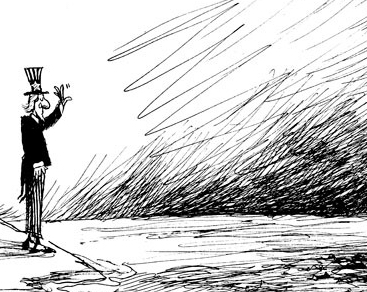One of our oldest and most cherished principles is that ‘it is better that a hundred guilty persons escape than that one innocent suffer’. At least, it used to be. But do we still believe it? We certainly act as if we don’t.
Consider the 4th Amendment. You have a right to privacy; but you also have a right to property. And if someone violates the latter, it may be necessary to conduct a search in order to prove it.
So the 4th Amendment lays out the terms of a compromise: such a search may be executed only when there is probable cause to believe that a crime has been committed, sufficient to secure a warrant; and only if the search is limited to looking for specific items in specific places.
But over the years, the courts have carved out a number of exceptions to this compromise — the most familiar being that you can be searched by a government agent, absent probable cause, as a condition for boarding an airplane, or entering a courthouse. But exceptions have been created for situations involving drugs, automobiles, immigration, public schools, terrorism, guns, and so on. And to protect police officers who have trouble remembering (or just caring) where all the lines have been drawn, catch-all exceptions like ‘exigent circumstances’, ‘good faith’, and ‘qualified immunity’ have been created.
What these exceptions have in common is that they are based on this idea: If we don’t allow the police to disregard the terms of the 4th Amendment compromise, some guilty person might get away with something.
And when innocent people are harmed, or even killed, as a result? Well, as Nancy Pelosi might say, they are just ‘collateral damage’.
Inevitably, this attitude has spilled over from searches to interactions with the police in general, to the point where people have been killed by the police for fleeing traffic stops, have had their houses destroyed by police pursuing petty criminals, have had their life savings seized without being charged with crimes, and so on.
Eric Garner was killed while being arrested because he was suspected of selling individual cigarettes. Hannah Fizer was killed while being arrested because she was suspected of running a red light. George Floyd was killed while being arrested because he was suspected of passing a counterfeit bill. Note that as mere suspects, all these people were entitled to the presumption of innocence. But that appears to be yet another quaint idea that has overstayed its welcome in America.
Our new bedrock principles are: (1) The guilty must be caught and punished at any cost; and (2) once started, arrests must be completed at any cost. And what is that cost? For a suspect, the cost may be his life. For America itself, the cost is its soul.
H.L. Mencken defined ‘puritanism’ as the haunting fear that someone, somewhere, may be happy. We may already have passed the point where ‘Americanism’ could be defined as the intolerable fear that someone, somewhere, may be getting away with something.
JFK once said that ‘there is little value in insuring the survival of our nation if our traditions do not survive with it’. If punishing the guilty has become more important to us than protecting the innocent, then maybe it’s time to move on, as the Declaration of Independence recommends, to whatever comes after America.
